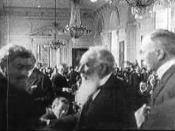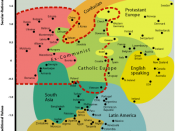"We cannot hold a torch to light another'spath without brightening our own."---Ben Sweetland--IntroductionOne could argue that cultural differences no longer play an important role in negotiations. Certainly, cultural differences are always present, but these differences can be overcome by accepting that the process is universal. People are influenced by their culture, but other things as well -- most importantly their professional socialization - in law, in business management, in science, in engineering fields. The purpose of this paper is to study, within case analyses framework, whether cultural influence can be detected in cross-cultural negotiations. This paper will also attempt to establish the significance and effect of culture on negotiations and aim to define culture and the important role it plays during the process of negotiation.
Definition of TermsThe influence of culture on negotiations has been studied in various settings including case analysis and furthermore, in disentangling the key elements of culture - values, beliefs, perceptions, and outlooks - one can understand how these cultural elements clearly translate into basic orientations to the negotiation process (Adler, 1987).
Negotiators from other cultures may think differently due to their values, beliefs, and assumptions.
Culture is symbolic communication. Some of its symbols include a group's skills, knowledge, attitudes, values, and motives. The meanings of the symbols are learned and deliberately perpetuated in a society through its institutions. A culture is a way of life of a group of people--the behaviors, beliefs, values, and symbols that they accept, generally without thinking about them, and that are passed along by communication and imitation from one generation to the next. It refers to the cumulative deposit of knowledge, beliefs, experience, values, attitudes, meanings, hierarchies, religion, notions of time, roles, spatial relations, concepts of the universe, and material objects and possessions acquired by a group of people in...


